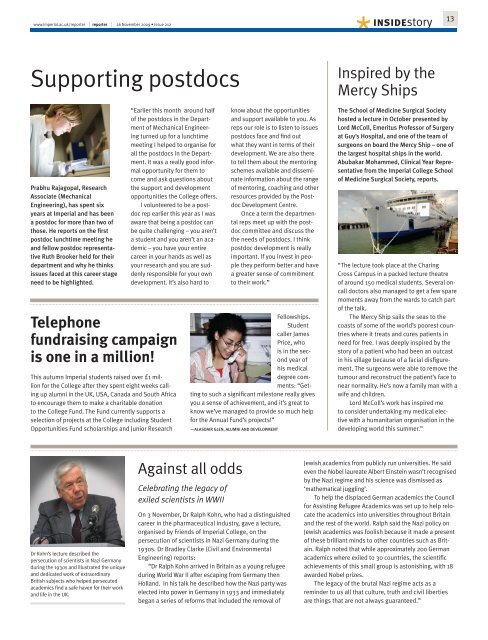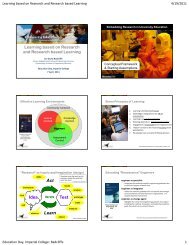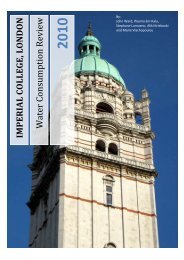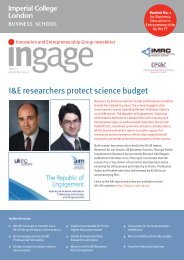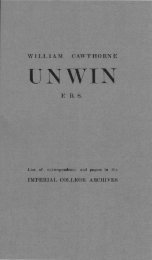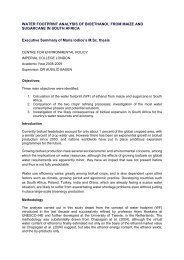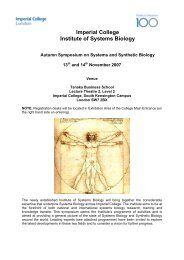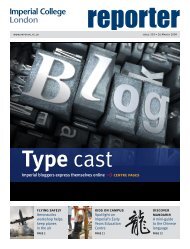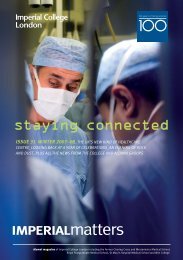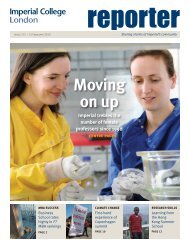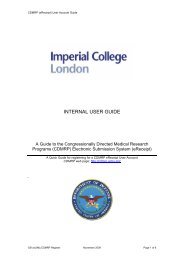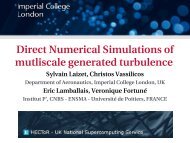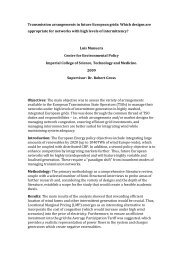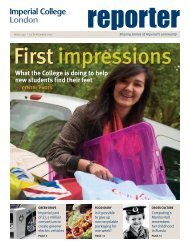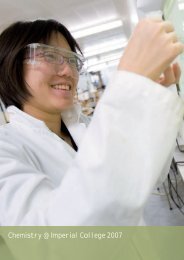212 pdf - Imperial College London
212 pdf - Imperial College London
212 pdf - Imperial College London
You also want an ePaper? Increase the reach of your titles
YUMPU automatically turns print PDFs into web optimized ePapers that Google loves.
www.imperial.ac.uk/reporter | reporter | 26 November 2009 • Issue <strong>212</strong> insidestory<br />
Supporting postdocs<br />
prabhu Rajagopal, Research<br />
associate (mechanical<br />
Engineering), has spent six<br />
years at imperial and has been<br />
a postdoc for more than two of<br />
those. he reports on the first<br />
postdoc lunchtime meeting he<br />
and fellow postdoc representative<br />
Ruth brooker held for their<br />
department and why he thinks<br />
issues faced at this career stage<br />
need to be highlighted.<br />
Dr Kohn’s lecture described the<br />
persecution of scientists in Nazi Germany<br />
during the 1930s and illustrated the unique<br />
and dedicated work of extraordinary<br />
British subjects who helped persecuted<br />
academics find a safe haven for their work<br />
and life in the UK.<br />
“Earlier this month around half<br />
of the postdocs in the Department<br />
of Mechanical Engineering<br />
turned up for a lunchtime<br />
meeting I helped to organise for<br />
all the postdocs in the Department.<br />
It was a really good informal<br />
opportunity for them to<br />
come and ask questions about<br />
the support and development<br />
opportunities the <strong>College</strong> offers.<br />
I volunteered to be a postdoc<br />
rep earlier this year as I was<br />
aware that being a postdoc can<br />
be quite challenging – you aren’t<br />
a student and you aren’t an academic<br />
– you have your entire<br />
career in your hands as well as<br />
your research and you are suddenly<br />
responsible for your own<br />
development. It’s also hard to<br />
telephone<br />
fundraising campaign<br />
is one in a million!<br />
This autumn <strong>Imperial</strong> students raised over £1 million<br />
for the <strong>College</strong> after they spent eight weeks calling<br />
up alumni in the UK, USA, Canada and South Africa<br />
to encourage them to make a charitable donation<br />
to the <strong>College</strong> Fund. The Fund currently supports a<br />
selection of projects at the <strong>College</strong> including Student<br />
Opportunities Fund scholarships and Junior Research<br />
Against all odds<br />
Celebrating the legacy of<br />
exiled scientists in WWII<br />
know about the opportunities<br />
and support available to you. As<br />
reps our role is to listen to issues<br />
postdocs face and find out<br />
what they want in terms of their<br />
development. We are also there<br />
to tell them about the mentoring<br />
schemes available and disseminate<br />
information about the range<br />
of mentoring, coaching and other<br />
resources provided by the Postdoc<br />
Development Centre.<br />
Once a term the departmental<br />
reps meet up with the postdoc<br />
committee and discuss the<br />
the needs of postdocs. I think<br />
postdoc development is really<br />
important. If you invest in people<br />
they perform better and have<br />
a greater sense of commitment<br />
to their work.”<br />
Fellowships.<br />
Student<br />
caller James<br />
Price, who<br />
is in the second<br />
year of<br />
his medical<br />
degree comments:“Getting<br />
to such a significant milestone really gives<br />
you a sense of achievement, and it’s great to<br />
know we’ve managed to provide so much help<br />
for the Annual Fund’s projects!”<br />
—alasdaiR GlEN, alumNi aNd dEvElopmENt<br />
On 3 November, Dr Ralph Kohn, who had a distinguished<br />
career in the pharmaceutical industry, gave a lecture,<br />
organised by Friends of <strong>Imperial</strong> <strong>College</strong>, on the<br />
persecution of scientists in Nazi Germany during the<br />
1930s. Dr Bradley Clarke (Civil and Environmental<br />
Engineering) reports:<br />
“Dr Ralph Kohn arrived in Britain as a young refugee<br />
during World War II after escaping from Germany then<br />
Holland. In his talk he described how the Nazi party was<br />
elected into power in Germany in 1933 and immediately<br />
began a series of reforms that included the removal of<br />
Inspired by the<br />
Mercy Ships<br />
13<br />
the school of medicine surgical society<br />
hosted a lecture in october presented by<br />
lord mcColl, Emeritus professor of surgery<br />
at Guy’s hospital, and one of the team of<br />
surgeons on board the mercy ship – one of<br />
the largest hospital ships in the world.<br />
abubakar mohammed, Clinical year Representative<br />
from the imperial <strong>College</strong> school<br />
of medicine surgical society, reports.<br />
“The lecture took place at the Charing<br />
Cross Campus in a packed lecture theatre<br />
of around 150 medical students. Several oncall<br />
doctors also managed to get a few spare<br />
moments away from the wards to catch part<br />
of the talk.<br />
The Mercy Ship sails the seas to the<br />
coasts of some of the world’s poorest countries<br />
where it treats and cures patients in<br />
need for free. I was deeply inspired by the<br />
story of a patient who had been an outcast<br />
in his village because of a facial disfigurement.<br />
The surgeons were able to remove the<br />
tumour and reconstruct the patient’s face to<br />
near normality. He’s now a family man with a<br />
wife and children.<br />
Lord McColl’s work has inspired me<br />
to consider undertaking my medical elective<br />
with a humanitarian organisation in the<br />
developing world this summer.”<br />
Jewish academics from publicly run universities. He said<br />
even the Nobel laureate Albert Einstein wasn’t recognised<br />
by the Nazi regime and his science was dismissed as<br />
‘mathematical juggling’.<br />
To help the displaced German academics the Council<br />
for Assisting Refugee Academics was set up to help relocate<br />
the academics into universities throughout Britain<br />
and the rest of the world. Ralph said the Nazi policy on<br />
Jewish academics was foolish because it made a present<br />
of these brilliant minds to other countries such as Britain.<br />
Ralph noted that while approximately 200 German<br />
academics where exiled to 30 countries, the scientific<br />
achievements of this small group is astonishing, with 18<br />
awarded Nobel prizes.<br />
The legacy of the brutal Nazi regime acts as a<br />
reminder to us all that culture, truth and civil liberties<br />
are things that are not always guaranteed.”


